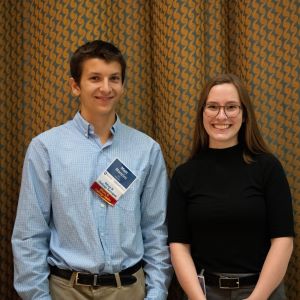2019 Results
Phase Three Winners
The third and final phase of the 2019 Nittany AI Challenge concluded when seven final teams presented their minimum viable products (MVPs) to a panel of judges. Three teams were chosen to receive funding from the remaining $25,000 pool of funds.
Revu — $15,000 Winner

Revu keeps students engaged when learning from reading assignments by automatically generating multiple choice quizzes that help them stay focused while also testing comprehension of key concepts. A bank of generated keywords also guides students in identifying which parts of the reading are most important to comprehend. Future feature implementations will include flash card generation, saving quizzes and notes to particular courses, and a mode specifically for instructors.
Team members (pictured from left to right): Matthew Mancini and Christina Warren (Team Lead)
LionPad — $5,000 Winner

LionPad provides students with resources to efficiently and comfortably navigate all stages of the housing search process, connecting students with their ideal living situation.
Team members (pictured from left to right): Jack Mentch (Team Lead), Neil Ashtekar, Ishan Muzumdar, and Nikhil Nayyar
Resilient Resumes — $5,000 Winner

Resilient Resumes is a web application for students to compile their personal information concisely and receive real-time feedback on how to improve their data for their resume. This system will be a place for a naive student who doesn’t know what to put in a resume to figure out how to best craft their data into their resume. Acting as a support to career services, this creates a working resume for the student. It provides a more polished product for both the student and career services department to work hand in hand to better the student’s chances at landing an internship or position after graduation.
Team members (pictured from left to right): Ethan Adams, Amie Croteau (Team Lead), Bryan Cruz Ulloa, Austin Tucker, and Ian Morrissey
Phase Two Winners
Ten prototypes were selected to receive $1,500 for further development of a minimum viable product.
AIeMS: AI Energy Management System
Artificial Intelligence Energy Management System (AIeMS) is a web-based platform where Penn State building managers may gather insights through data visualizations and predictive analytics models built on sensor and social data gathered from any Penn State campus. This includes live-stream data from low cost energy-harvesting sensors, measuring occupancy, lighting, temperature, and humidity, as well as live user feedback from students and faculty reporting their thermal comfort levels through a web and mobile-based interface. The platform also offers data integration and AI–based dashboards, which will allow actionable insights to promote conservation of energy, reduce energy costs at Penn State, and engage students and faculty with goals toward sustainable campuses. Team members: Carly Clayman (Team Lead), Ishita Daga, Anchal Gupta, Achyuta Jha
AIODA (AI On-Demand Advising)
AIODA (AI On-Demand Advising) is a smart academic chatbot that utilizes AI, specifically machine learning, to help students answer more on-demand academic questions and serves as a pre-screening tool for advisors by generating academic demographic reports. We are a higher education cloud solution designed to serve as an academic tool for both the student and the advisor. Team members: Nitya Govind (Team Lead), Austin Gongora, Mukesh Kandamaran, Marshall Malino, Rommel Silva
CourseCat: A Smarter Course Catalog
CourseCat is a smart course catalog that makes it easy for students to browse through the thousands of courses offered at Penn State. We’ve built a user-friendly search platform that is more effective than currently available course search tools. In addition, we use natural language processing to make course recommendations and help students explore courses based on their content. CourseCat is available at CourseCat.net. Team members: Michael Hoffman (Team Lead), Jay Vyas
Deep Sign
DeepSign tackles the issue of communicating with the aurally challenged and aims to enhance the quality and clarity of interaction with the help of artificial intelligence. Team members: Pakhi Agarwal (Team Lead), Jian Liao, Visweshwar Srinivasan, Niranjan Thirusangu
EngagePSU
EngagePSU is a smart, matchmaking tool that makes getting involved on campus easier. Whether it is joining a club, conducting research in your field, or attending any campus event, EngagePSU will make finding the right activity painless with up-to-date information all in one location. Team members: Saahithi Mallarapu (Team Lead), Manasvi Mittal, Prajwal Chandrashekar, Medha Deeptimahanti, Joshua Deleon, Eesh Kamrah, Anmolika Singh
LionPad
The mission of LionPad is to provide students with the resources they need to efficiently and comfortably navigate all stages of the housing process and connect them with their ideal living situation. Team members: Jack Mentch (Team Lead), Neil Ashtekar, Ishan Muzumdar, Nikhil Nayyar
NSO QuickAdvisor
NSO QuickAdvisor is a virtual assistant that answers common advising questions during Penn State’s New Student Orientation (NSO). The tool aims to lighten the load on advisors present during student scheduling sessions, freeing up precious time for meaningful and personalized interaction. Team members: John Dukewich (Team Lead), Anthony Donato, Thomas Hoover, Michael Maslakowski, Austin Thoet
Resilient Resumes
Resilient Resumes is a launchpad for students to compile their personal information concisely and receive real-time feedback on how to improve their data. This system will be a place for a naive student who doesn’t know what to put in a resume and the seasoned student who is refining their resume. Acting as a support to career services, this creates a working resume for the starting student or provides extra feedback to the senior student. It provides a more polished product for both the student and career services department to work hand in hand to better the student’s chances at landing a job. Team members: Amie Croteau (Team Lead), Ethan Adams, Bryan Cruz Ulloa, Ian Morrissey, Austin Tucker
Revu
Revu keeps students engaged when learning from reading assignments by automatically generating multiple choice quizzes that help them stay focused while also testing comprehension of key concepts. A bank of generated keywords also guides students in identifying which parts of the reading are most important to comprehend. Future feature implementations will include flash card generation, saving quizzes and notes to particular courses, and a mode specifically for instructors. Team members: Christie Warren (Team Lead), Matt Mancini
uApplication
uApplication is an online marketplace for counselors and mentors for admission consulting. Students will have access to the specialized knowledge of mentors who are willing to assist them in test coaching, essay assistance, choosing colleges, private video conversation for specific needs, and setting career choices that are reputable and attainable and provide help to stay timely and organized during the entire application process. On top of one-on-one human level feedback, the platform leverages state-of-the-art machine learning and AI techniques to provide data driven feedback tailored specifically to each student’s profile, choices, interests, strengths, weaknesses, and personality. Team members: Bikalpa Neupane (Team Lead), Joseph Samuel Binkin, Mohammad Mahdi Kamani, Vidur Mishra
Phase One Winners
Twenty projects were awarded $500 in prizes for the development of a prototype.
- AIeMS: AI Energy Management System
- AIODA (AI On-Demand Advising)
- AWARE & U Sexual Assault Prevention App
- CATA Smart-Loop
- CourseCat: A Smarter Course Catalog
- Deep Sign
- EngagePSU
- Hybrid Recommender System for Penn State Clubs
- iApplication
- Library Resource Recommendation & Summarization
- LionLight
- LionPad
- Matching Utility for Clubs At Penn State
- New Student AI Guide
- NSO QuickAdvisor
- Prospect Career Exploration Tool
- Resilient Resumes
- Revu
- U/Curate
- University Course Scheduling

